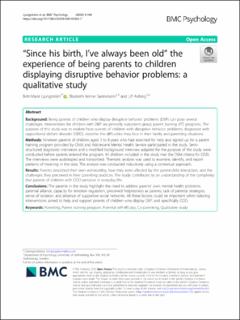| dc.description.abstract | Background: Being parents of children who display disruptive behavior problems (DBP) can pose several challenges. Interventions for children with DBP are primarily outpatient group parent training (PT) programs. The purpose of this study was to explore how parents of children with disruptive behavior problems, diagnosed with oppositional defiant disorder (ODD), describe the difficulties they face in their family and parenting situations.
Methods: Nineteen parents of children aged 3 to 8 years who had searched for help and signed up for a parent training program provided by Child and Adolescent Mental Health Service participated in the study. Semistructured diagnostic interviews and a modified background interview adapted for the purpose of the study were conducted before parents entered the program. All children included in the study met the DSM criteria for ODD. The interviews were audiotaped and transcribed. Thematic analysis was used to examine, identify, and report patterns of meaning in the data. The analysis was conducted inductively using a contextual approach.
Results: Parents described their own vulnerability, how they were affected by the parent-child interaction, and the challenges they perceived in their parenting practices. The study contributes to an understanding of the complexity that parents of children with ODD perceive in everyday life.
Conclusions: The parents in the study highlight the need to address parents’ own mental health problems, parental alliance, capacity for emotion regulation, perceived helplessness as parents, lack of parental strategies, sense of isolation, and absence of supportive social networks. All these factors could be important when tailoring interventions aimed to help and support parents of children who display DBP, and specifically ODD. | en_US |
